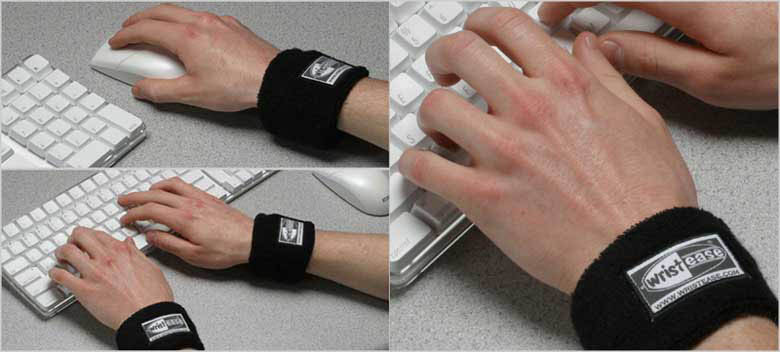|
Carpal
Tunnel Syndrome: Preventing the Pain in Your Hands and Wrists
What
is carpal tunnel syndrome?
Carpal tunnel
syndrome is a painful disorder of the wrist and hand. The carpal
tunnel is a narrow tunnel formed by the bones and other tissues
of your wrist. This tunnel protects your median nerve. The median
nerve gives you feeling in your thumb, and index, middle and ring
fingers. But when other tissues in the carpal tunnel, such as
ligaments and tendons, get swollen or inflamed, they press against
the median nerve. That pressure can make part of your hand hurt
or feel numb.
What
leads to carpal tunnel syndrome?
Doing the
same hand movements over and over can lead to carpal tunnel syndrome.
It's most common in people whose jobs require pinching or gripping
with the wrist held bent. People at risk include people who use
computers, carpenters, grocery checkers, assembly-line workers,
meat packers, violinists and mechanics. Hobbies such as gardening,
needlework, golfing and canoeing can sometimes bring on the symptoms.
Carpal tunnel
syndrome is linked to other things too. It may be caused by an
injury to the wrist, such as a fracture. Or it may be caused by
a disease such as diabetes, rheumatoid arthritis or thyroid disease.
Carpal tunnel syndrome is common during the last few months of
pregnancy.
How
is carpal tunnel syndrome diagnosed?
Your doctor
will probably ask you about your symptoms. He or she may examine
you and ask you how you use your hands. Your doctor may also do
these tests:
-
Your doctor
may tap the inside of your wrist. You may feel pain or a sensation
like an electric shock.
-
Your doctor
may ask you to bend your wrist down for 1 minute to see if this
causes symptoms.
-
Your doctor
may have you get a nerve conduction test or an electromyography
(EMG) test to see whether the nerves and muscles in your arm
and hand show the typical effects of carpal tunnel syndrome.
How
serious is carpal tunnel syndrome?
Carpal tunnel
syndrome usually isn't serious. With treatment, the pain will usually
go away and you'll have no lasting damage to your hand or wrist.
How
is carpal tunnel syndrome treated?
If carpal tunnel
syndrome is caused by a medical problem, your doctor will probably
first treat that problem.
Your doctor
may ask you to rest your wrist or change how you use your hand.
Your doctor may also ask you to wear a splint on your wrist. The
splint keeps your wrist from moving but lets your hand do most of
what it normally does. A splint can help ease the pain of carpal
tunnel syndrome, especially at night.
Putting ice
on your wrist, massaging the area and doing stretching exercises
may help too.
What
about medicine?
Your doctor
may suggest that you use a medicine such as ibuprofen (one brand
name: Motrin), naproxen (brand name: Aleve), ketoprofen (brand name:
Orudis) or aspirin to help ease the pain.
Your doctor
may give you a shot in the carpal tunnel with a drug such as cortisone.
This may help stop the swelling and inflammation and ease the pain.
But the relief may not last.
What
if these treatments don't help?
In some cases,
surgery is needed to make the symptoms go away completely. The
surgery involves cutting the ligament that may be pressing on
your median nerve. You'll usually get back the normal use of your
wrist and hand within a few weeks to months after surgery.
Doing the
hand, wrist and finger exercises that your doctor tells you to
do after surgery is very important. Without exercise, your wrist
may get stiff and you may lose some use of your hand.
Can
I prevent carpal tunnel syndrome?
Yes. See the
box below for some tips on preventing carpal tunnel syndrome.
Many products
you can buy--such as wrist rests--are supposed to ease symptoms
of carpal tunnel syndrome. Some people may have less pain and
numbness after using these products. But other people may have
worse symptoms. No one has proved that these products really prevent
wrist problems.
Reviewed/Updated:
03/05
Created: 1996
This
article provides a general overview on this topic and may not apply
to everyone. To find out if this article applies to you and to get
more information on this subject, talk to your family doctor.

Copyright
© 1996-2005 American Academy
of Family Physicians
Permission is granted to print and photocopy this material for nonprofit
educational uses.
Written permission is required for all other uses, including electronic
uses. |